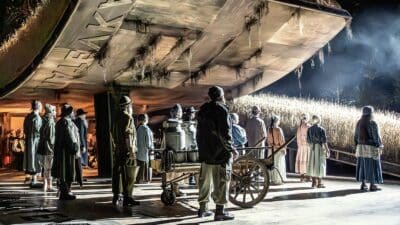Music

Plus One
The 11 best Libertines songs
To celebrate the return to the stage of the boys in the band, we are counting down the 11 best songs by The Libertines
The Libertines have had many ups and downs. Their meteoric rise as the new UK saviours of garage rock provided the noughties musical scene with its own very British equivalent to The Strokes. The Libertines rode the indie rock boom with style and chaos but their star faltered after a schism rooted in self destructive behaviour tore the band apart. What they left behind (besides at least one Peter Doherty lookalike in every pub) was a legacy for the indie genre in their raw, punk-coded sound and iconic look that would come to shape the early 2000s.
Now thankfully in their peacetime era, the good ship Albion is back on course with the Libertines’ fourth studio album All Quiet On The Eastern Esplanade released earlier this year. With the boys back on tour (and back on speaking terms…), we’re breaking down 11 of the best Libertines songs to date.
11. ‘Night Of The Hunter‘
(All Quiet On The Eastern Esplanade, 2024)
As the second single from All Quiet On The Eastern Esplanade, ‘Night Of The Hunter’ offers a slower, less explosive foil to the themes of ‘Run Run Run’. It’s a narrative of a tragic lawbreaker phoning a lover to tell them they’re about to be arrested; the time has come to face the music. With themes of murder and predetermination underpinning strong lyrics boasting that Libertine dry wit, the song neatly weaves storytelling and a standard of music you can’t help replaying.
10. ‘I Get Along‘
(Up The Bracket, 2002)
With its messy pub punk rock sound and Carl’s snarling vocal, ‘I Get Along’ is the early Libertines at their best. At times hysterical, the song showcases the group’s idiosyncratic tightrope walk; managing to retain melodic moments while delivering a thunderous rhythmic display. With its devil-may-care spirit and rapid delivery, this track stood as a swaggering statement of what the The Libertines’ rock credentials meant to the new millennium.
9. ‘Gunga Din‘
(Anthems For Doomed Youth, 2015)
Announcing their triumphant comeback in 2015, ‘Gunga Din’ was the first single from Anthems For Doomed Youth, The Libertines long awaited third album. Powered by a signature offbeat guitar riff from Carl and brave earnest lyrics, it offers a jaded window into the group’s history of self-destructive behaviour while echoing their present-day need for change. Borrowing the song’s title and a couple of lyrics from Rudyard Kipling’s 1892 poem, Pete and Carl’s love of British literature and culture looms large behind the track to dramatic effect.
8. ‘The Good Old Days‘
(Up The Bracket, 2002)
Grandiose and poetic, ‘The Good Old Days’ is a neat encapsulation of the spirit of the group’s early oeuvre. Perhaps one of the best examples of The Libertines’ ornate staple of tragically looking backwards while their present day vehicle freewheels off the cliff’s edge. With lines such as “If you’ve lost your faith in love and music then the end won’t be long”reading like a Wildean epigram, Doherty’s lyrical flair is on full display.
7. ‘What Became Of The Likely Lads‘
(The Libertines, 2004)
Very few bands have captured a lusting nostalgia the way The Libertines have. Packed with biting wit and melancholy reflection,’ What Became Of The Likely Lads’ signals the fatalistic drift between Pete and Carl. It serves as an angst-ridden ballad to the band’s golden days, now fondly looked back on just a few short years later with the present cracks in the boat becoming harder to ignore. Juxtaposed with an upbeat jaunty sound and a title pinched from a classic British sitcom, it’s a charming musical nod to life’s tumultuous and unpredictable nature.
6. ‘Run Run Run‘
(All Quiet On The Eastern Esplanade, 2024)
As The Libertines’ first single from their most recent album, ‘Run Run Run’, proved that the lads were still capable of greatness. With its frantic pace and existential musings, it’s an espresso-fueled dash through a minefield of memories. With its restless energy and introspective lyrical themes, the song has all the elements that make the group great in perfect balance; a scrappy resilience, that playful pinch of madness and a touch of nostalgia. As described by Carl “The song doesn’t have to be about running away from your past. It’s about running because that’s what you do. It can be in terror, or it can be a thing of great elation or purpose”.
5. ‘Music When The Lights Go Out‘
(The Libertines, 2004)
Proving themselves capable of emoting without starting a riot, ‘Music When The Lights Go Out’ is one of The Libertines’ slowest and most compelling songs. Ever the precocious poet, the heartfelt track was one of Pete Doherty’s first, penned when he was just 16 years old. With powerful lyrics “Is it cruel or kind not to speak my mind and to lie to you rather than hurt you”, It creates a painfully relatable picture of the breakdown of a once promising relationship and the internal bargaining conversation about letting go. Accompanied by graceful lead guitar from Carl, the song is a standout display Doherty’s talent as a lyricist and songwriter.
4. ‘Time For Heroes‘
(Up The Bracket, 2002)
To many, it’s the quintessential track from Time For Heroes, taking a peep through the looking glass into the unpolished energy of the band’s early years. Inspired by Doherty’s own heightened misadventures getting caught up in the May Day riots, the song became something of an anthem for the disillusioned youth of its time. With impassioned, slurring vocal delivery, paired with the frenetic instrumentation, the song creates a palpable sense of excitement and rebellion. The lyrics, spilling over with vivid imagery and resonant observations, still hold on to Doherty’s brand of comic social commentary with lines such as “There are fewer more distressing sights than that of an Englishman in a baseball cap”.
3) ‘What A Waster‘
(Up The Bracket, 2002)
Loud, crass and deceptively clever, The Libertines’ debut single overturned the table of the noughties music scene. Aptly described by the group’s biographer as the “best British debut single since Oasis released ‘Supersonic‘” ‘What A Waster’ paints a brilliant narrative of an embittered bystander in a presumably soured relationship. The track, with its all-too-true self-fulfilling prophetic themes, is weighty and rich with the Libs’ characteristic brand of mayhem, showcasing both Doherty’s articulation and the group’s punk-infused raw sound. With the rapid-fire guitar rhythm matched by the quick spat-delivery of barbed expletive lyrics, the song is an adrenalised rollercoaster ride.
2. ‘Don’t Look Back Into The Sun‘
(Released as a single, 18 August 2003)
With its iconic music video that made red British Army jackets indie staples, ‘Don’t Look Back Into The Sun’ was many fans’ first exposure to The Libertines. Borrowing the chords and half of the title of Oasis’s seminal hit ‘Don’t Look Back In Anger’ for its euphoric melody, it was as if the boys had been passed the mantle from the previous brit rock generation. And with it, a solid green light for the start of the British indie boom. It gave the British scene what The Strokes had contributed in the US: a promise that the next decade would be a golden age for music. Just hearing that intro riff is enough…
1. ‘Can’t Stand Me Now‘
(The Libertines, 2004)
It’s ironic, but true to form, that the purest example of The Libertines’ sound would also be a death knell for the band. With the controlled chaos of its weaving guitars, and a relay of duelling lead vocals polished off by a heartbreaking chorus, ‘Can’t Stand Me Now’ articulated the growing chasm within the group. All accusations and excuses delivered in call and response fashion between Pete and Carl, the song was so raw that it often led to fights on stage in the final gigs before the group called it quits in 2004. But decades on, the track stands the test of time as a brilliant example of The Libertines at their best.









